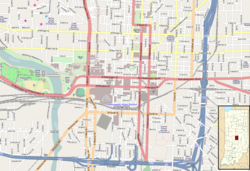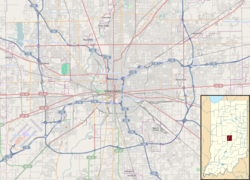Birch Bayh Federal Building
|
U.S. Courthouse and Post Office
|
|
 |
|
| Location | 46 E. Ohio St., Indianapolis, Indiana |
|---|---|
| Coordinates | 39°46′14″N 86°9′25″W / 39.77056°N 86.15694°WCoordinates: 39°46′14″N 86°9′25″W / 39.77056°N 86.15694°W |
| Area | 3.8 acres (1.5 ha) |
| Built | 1905 |
| Architect | Multiple |
| Architectural style | Late 19th and 20th Century Revivals, Classical Revival |
| NRHP Reference # | 74000033 |
| Added to NRHP | January 11, 1974 |
The Birch Bayh Federal Building and U.S. Courthouse, formerly known as the U.S. Courthouse and Post Office and as the Federal Building, is a courthouse of the United States District Court for the Southern District of Indiana, located in Indianapolis. It is a distinguished example of Beaux-Arts architecture, and was listed in the National Register of Historic Places in 1974. Constructed from 1902 to 1905, the United States District Court for the District of Indiana met here until it was subdivided in 1928; the United States Circuit Court for the District of Indiana met here until that court was abolished in 1912. It was listed on the National Register of Historic Places as "U.S. Courthouse and Post Office" in 1974. The courthouse was renamed in honor of Senator Birch Bayh in 2003.
The building was one of only 35 federal buildings constructed under the Tarsney Act of 1893. The United States Treasury Department sought designs for the new federal building from private architectural firms through an open competition allowed under the Act. John Hall Rankin and Thomas Kellogg, noted Philadelphia architects, secured the design contract, and the Treasury Department accepted the New York-based John Pierce Company's low construction bid of $1,300,000. (The final cost, however, reached nearly $2,000,000.) Begun in 1902 and completed in 1905, the new federal building was massive. Accommodating 925 federal employees, the U-shaped, Beaux Arts structure occupied an entire block, rose four stories, and housed federal courts, offices, and the main post office.
Beaux Arts classicism, often reflected in federal buildings of this era, was popularized by the majestic buildings of the Chicago World's Fair in 1893. Monumental design and formal planning of spaces are hallmarks of the style. The Federal Building and U.S. Courthouse inspired Beaux Arts designs for other public buildings in Indianapolis, including Indianapolis City Hall (1910), the Indianapolis Public Library (1917), and buildings in the Indiana World War Memorial Plaza (dedicated in 1927).
...
Wikipedia




